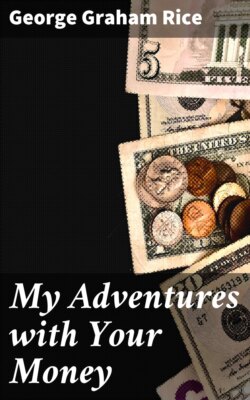Читать книгу My Adventures with Your Money - George Graham Rice - Страница 14
На сайте Литреса книга снята с продажи.
THE KENTUCKY COLONEL FALLS IN LINE
ОглавлениеTable of Contents
After separating himself from much cash, while one of his very intimate friends was "cleaning up" plenty of money on our selections, he finally strolled into our office one morning and sheepishly stated that one of his "fool friends" had asked him to step in and get our "fool selections" for him. We explained that it was against our rule to give out our choices before 12:30 P.M., whereat he grew exceedingly wroth. He finally agreed to our conditions, paid his money and was given an order to get the selections at the track-entrance from one of our messengers.
Nearly all of our choices won that day. Colonel Pepper came in the following morning and paid for another subscription, this time for a week's service. We were "in our stride," the majority of our selections winning from day to day, and Colonel Pepper had cause for exultation. On one of these days we divulged, on our racing sheet, the name of a "sleeper" that we were confident would win at 10 to 1, a big betting coup having been planned by that Napoleon of the turf, John Madden. The horse won at big odds, and Colonel Pepper made a "killing" on the information.
For the next day, our clockers had spotted another horse that had been got ready by the light of the moon, and we spread it pretty strong in our advertisements that the horse we would name could just fall down, get up again and then "roll home alone." The horse did not fall down; but he won; he "rolled home alone" by about ten lengths. He belonged to Colonel Pepper. It was anticipated that about 20 to 1 would be laid against this fellow, but on account of our strong tip, he opened at 10 to 1 and was played down to 3 to 1. The bookmakers were badly crimped.
The next day, as soon as the office opened, Colonel Pepper, hotter under the collar than even his name might indicate, stamped into the outer room. Slamming his cane down on the big mahogany table, he demanded in stentorian tones: "What in the —— does this —— business mean? Here I come and subscribe my good money to your —— fool tips, and you-all are so low-down mean as to give my hoss for the good thing yesterday! What does it mean, suh; what does it mean?"
The use of considerable diplomacy was necessary to calm down the irate Colonel, who had no compunctions in winning a big bet on Mr. Madden's "sleeper," but "—— it, suh, it is outrageous to treat me so."
The Colonel never got over that incident, and while he won a big bet on his own horse, he always claimed that Maxim & Gay had ruined the betting odds for him and that but for the vigilance of our clockers his winnings would have been twice as large. This was true, and time and again we ruined the price for many another owner who thought he was going to get away with something on the sly.
Bookmakers as a rule are very much self-satisfied about their knowledge of the mathematics of the game. In order to show them that they didn't know all about it, the Maxim & Gay Company inserted an advertisement one day reading substantially as follows:
YOU PAY US $5
WE REFUND $6
If the Horse We Name as
THE ONE BEST BET
To-day Does Not Win, We Will Not
Only Refund Our $5 Fee, Which Is
Paid Us for the Information, but Will
Pay Each Client an EXTRA DOLLAR
By Way of Forfeit.
Pay Us $5 To-day for Our One Best
Bet, and if the Horse Does Not Win
We Will Pay You $6 To-morrow.
MAXIM & GAY CO.
Our receipts that day were approximately $5,000. The horse did not win. We refunded $6,000 next day, and netted a considerable sum of money on the operation.
It happened to be a two-horse race. Our horse was at odds of 1 to 6 in the betting, that is to say, the bookmakers laid only one dollar against every six bet by the public. The other horse ruled at odds of 5 to 1, meaning that here the bookmakers laid five dollars against the public's one.
The Maxim & Gay Company sent to the track $1,000 out of the $5,000 paid in by its customers and wagered the $1,000 on the contending horse at odds of 5 to 1, drawing down $4,000 in winnings. From this money it paid its clients the thousand-dollar forfeit, netting $4,000 on the operation, after of course returning to them their own $5,000.
Had the 1 to 6 shot won, the clients who had received the winning tip would have been happy, while the Maxim & Gay Company would not have been compelled to refund any money and would have been ahead $4,000 on the operation, the $1,000 wagered and in that event lost in the betting ring on the other horse being subtracted from the $5,000 paid in by its customers. No matter which horse won our gain was sure to be $4,000 and we had here the ideal of a "sure thing."
It was a case of "taking candy from a baby"; and yet many of the wise bookmakers could not at first figure it out. Nearly all of them subscribed for the information. As for the public, they did not seem to catch on at all.
